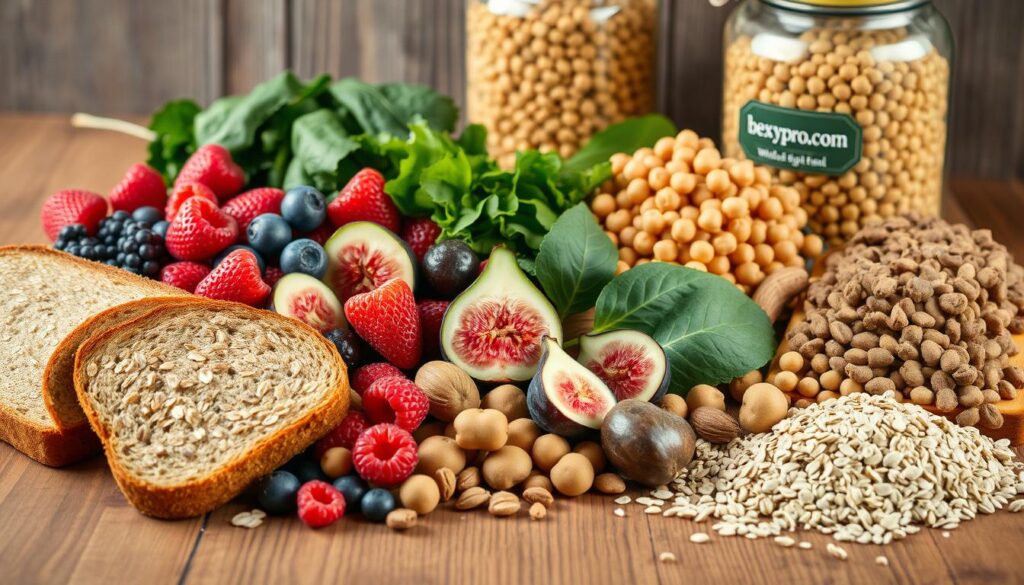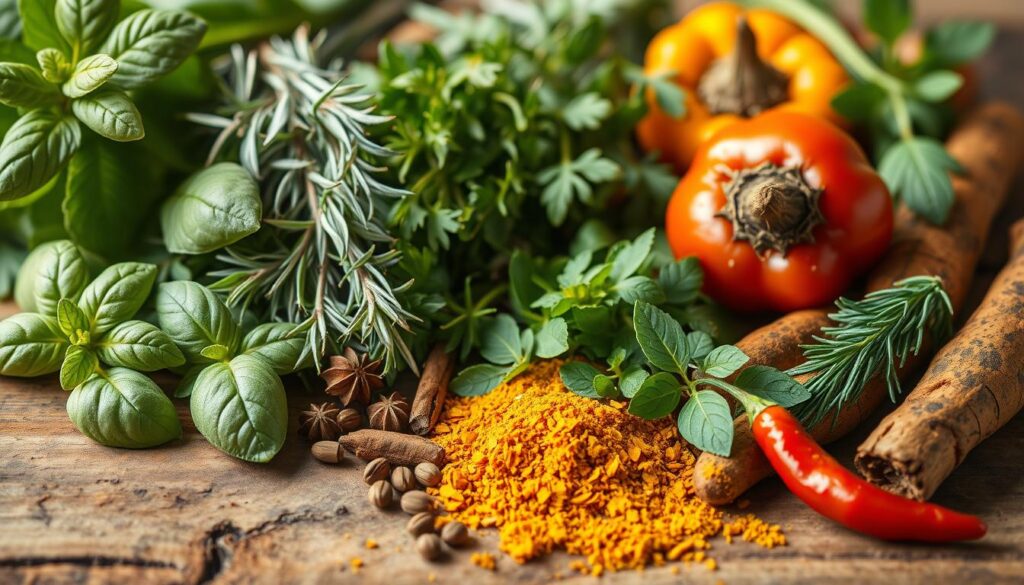Physical Address
304 North Cardinal St.
Dorchester Center, MA 02124
Physical Address
304 North Cardinal St.
Dorchester Center, MA 02124

Did you know your digestive system is home to trillions of microbes? These tiny organisms play a huge role in keeping you healthy. Dr. Jennifer Nayor, a renowned expert, emphasizes that nourishing these microorganisms through diet is key to maintaining a balanced digestive system.
Fiber is a superstar when it comes to supporting good bacteria. Soluble fiber feeds the probiotics in your gut, while insoluble fiber helps keep things moving smoothly. Gastroenterologists often highlight the dual role of fiber in promoting overall well-being.
You might be surprised to learn that some unconventional choices, like Roquefort cheese and Brussels sprouts, are excellent for your digestive system. These foods, along with others like kefir, miso, and kimchi, can make a big difference.
Your gut and brain are closely connected, and a healthy digestive system can even boost your immune system. In this article, I’ll reveal lesser-known foods backed by science that can help you feel your best. Plus, I’ll share some delicious recipe ideas like miso-glazed salmon and kefir smoothie bowls.
Your gut is more than just a digestive organ—it’s a powerhouse for overall health. Often referred to as the “second brain,” it influences everything from your mood to your immune system. Dr. Christine Lee emphasizes that a diverse gut microbiome is essential for maintaining this balance.
Did you know that 70% of your immune system resides in your gut? This connection means that a healthy gut can help protect you from illness. On the flip side, an unhealthy gut can lead to issues like bloating, constipation, and even skin rashes.
Gut inflammation is another critical factor. It’s linked to chronic diseases like heart disease and diabetes. Jean Anthelme Brillat-Savarin famously said, “You are what you eat,” and modern science backs this up. A diet rich in processed foods and high stress levels can disrupt your gut bacteria, leading to imbalance.
Here are some common signs of an unhealthy gut:
To restore balance, focus on dietary diversity. Incorporating a variety of nutrient-rich foods can help rebuild your gut microbiome. In the next section, I’ll explore specific food categories that can make a big difference.
Fermented foods have been a staple in diets worldwide for centuries. These foods are rich in probiotics, which are live bacteria that support a healthy digestive system. I’ve found that incorporating them into your meals can make a noticeable difference in how you feel.
Yogurt is one of the most popular fermented foods. It’s packed with probiotics that help balance your gut bacteria. When choosing yogurt, I recommend opting for plain, unsweetened varieties. Flavored options often contain added sugars, which can counteract the benefits.
Greek yogurt and Icelandic skyr are excellent choices. They’re thicker and often have higher protein content. Look for labels that mention live and active cultures, with at least 1 billion CFUs (colony-forming units) per serving.
Kefir is a fermented milk drink that originated in Central Asia. It’s similar to yogurt but has a thinner consistency and a tangier taste. What makes kefir stand out is its high probiotic content—some varieties contain up to 10 times more bacteria than regular yogurt.
I love adding kefir to smoothies or drinking it plain. It’s a quick and easy way to get a daily dose of probiotics. Plus, it’s a great option for those who find yogurt too heavy.
Miso, a traditional Japanese seasoning, is made from fermented soybeans. It’s rich in enzymes that survive digestion, making it a powerful ally for your gut. I often use miso to add depth to soups, marinades, and dressings.
Studies have shown that populations with high miso consumption tend to have healthier digestive systems. A little goes a long way, so start with small amounts to enjoy its unique umami flavor.
Fiber is the unsung hero of a healthy digestive system. It’s not just about keeping things moving—it’s about feeding the trillions of gut bacteria that keep you feeling your best. Dr. Jennifer Nayor explains that fiber comes in two forms: soluble and insoluble. Soluble fiber dissolves in water, feeding your beneficial bacteria, while insoluble fiber adds bulk to your stool, aiding digestion.

When it comes to fiber-rich vegetables, green peas and Brussels sprouts are top contenders. These nutrient-packed options are versatile and easy to incorporate into your meals. Let’s dive into why they’re so beneficial.
Green peas are a powerhouse of nutrition, offering 4.4 grams of fiber per half cup. Whether fresh or frozen, they retain their nutritional value, making them a convenient choice. Peas also contain prebiotic galacto-oligosaccharides, which help nourish your gut bacteria.
Here’s a quick tip: Try blending cooked peas into a creamy puree for a pasta sauce. It’s a delicious way to boost your fiber intake while keeping your meals exciting.
Brussels sprouts often get a bad rap, but they’re a nutritional superstar. These mini cabbages are rich in fiber and have been shown to combat H. pylori, a bacteria linked to stomach issues. Roasting them with olive oil and garlic can transform them into a crispy, flavorful side dish.
Adding these fiber-rich foods to your diet is a simple yet effective way to support your digestive health. Your gut bacteria will thank you!
Herbs and spices do more than add flavor—they’re secret weapons for your digestive system. These kitchen staples are packed with compounds that support your gut microbiome and overall health. I’ve found that incorporating them into meals is an easy way to enhance both taste and well-being.

Garlic is a powerhouse when it comes to gut health. It contains allicin, a compound with strong antibacterial properties. To activate allicin, crush the garlic and let it sit for 10 minutes before cooking. This simple step ensures you get the most benefits.
Studies show that garlic increases beneficial bifidobacteria, which are essential for a balanced microbiome. If raw garlic isn’t your thing, try fermented black garlic. It’s milder in flavor and retains its gut-friendly properties.
Ginger is another must-have for digestive health. It’s a natural digestive stimulant that can ease nausea and improve digestion. I often recommend ginger tea for its soothing effects. Just steep fresh ginger slices in hot water for a quick, gut-friendly drink.
Ginger also contains polyphenols, which support a healthy gut lining. Whether you use it fresh, dried, or in tea, ginger is a versatile addition to your diet.
Healthy fats play a crucial role in supporting your digestive system. They not only provide energy but also help maintain a balanced microbiome. Including the right fats in your diet can make a significant difference in how you feel.
Extra virgin olive oil (EVOO) is a staple in Mediterranean diets for good reason. It’s rich in polyphenols, which have anti-inflammatory properties. One key compound, hydroxytyrosol, is easily absorbed and supports gut health.
When cooking with olive oil, consider its smoke point. For high-heat cooking, use refined olive oil. For dressings or low-heat dishes, EVOO is ideal. A daily tablespoon can provide the benefits without overdoing it.
Almonds are more than just a tasty snack—they’re packed with prebiotics found in their skins. These compounds feed the beneficial bacteria in your microbiome, promoting a healthy digestive system.
I recommend a small handful of almonds as a daily snack. They’re convenient, nutrient-dense, and great for on-the-go energy. Pair them with a piece of fruit for a balanced treat.
Exploring lesser-known foods can unlock surprising benefits for your digestive system. While yogurt and kefir often steal the spotlight, there are other unique options that deserve attention. Let’s dive into two standout choices: kimchi and kombucha.
Kimchi is a fermented vegetable dish that’s a staple in Korean cuisine. It’s packed with over 150 strains of probiotic bacteria, making it a powerhouse for digestive health. The key ingredient, gochugaru pepper, adds a spicy kick and has anti-inflammatory properties.
One of the standout nutrients in kimchi is vitamin K2, which supports bone health and aids in calcium absorption. I love using kimchi in fried rice—it’s a quick, flavorful way to incorporate this superfood into your meals. Here’s why kimchi is worth trying:
Kombucha, a fizzy fermented tea, has gained popularity for its tangy flavor and health benefits. Originating in Manchuria, it’s made using a SCOBY (Symbiotic Culture of Bacteria and Yeast), which transforms sweet tea into a probiotic-rich drink.
This unique fermentation process creates a beverage that’s not only refreshing but also supports digestive health. I often enjoy kombucha as a midday pick-me-up—it’s a healthier alternative to sugary sodas. Here’s what makes kombucha special:
Adding kimchi and kombucha to your diet is an easy way to explore new flavors while supporting your digestive system. These unexpected foods might just become your new favorites!
Incorporating gut-friendly foods into your daily routine doesn’t have to be complicated. Start with simple meal planning by adding a few of these ingredients each week. For example, try a miso-glazed salmon recipe or a kefir smoothie bowl for breakfast. These recipes are easy to prepare and packed with nutrients.
To avoid bloating, introduce these foods gradually. Pair probiotics like yogurt with prebiotics like garlic pea puree for a balanced diet. Keeping a food journal can help track how your body responds and identify what works best for your digestion.
Consider creating a shopping list focused on gut-supporting items. Fermentation starter kits are also a fun way to explore making your own kimchi or kombucha at home. With these tips, you’ll be on your way to a healthier lifestyle in no time!